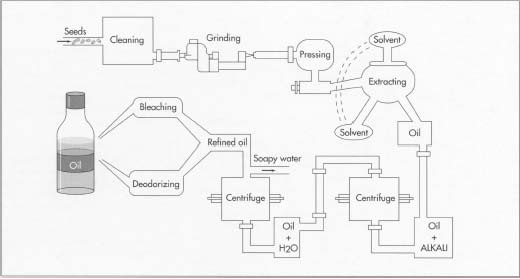In a previous newsletter, we started a discussion of the impact that metabolic disease has on COVID death risk by looking at what metabolic syndrome is and how it’s evaluated.
This discussion started with a claim from the Los Angeles Laker’s nutritionist that people dying from COVID were only dying because of poor metabolic health, which she blames on sugar and seed oil.
It’s certainly true that people with underlying metabolic issues tend to be the ones who get really sick from COVID. And it’s not exactly revolutionary to suggest that sugar is bad for you.
These things are pretty well established at this point.
But blaming the oils that many of us eat everyday? We’re talking about soybean oil, vegetable oil, canola oil, corn oil - how can these be bad for us?
Doesn’t the American Heart Association recommend cooking with these?
What could vegetable oil possibly have to do with metabolic dysfunction? Let’s digress for a minute to see where these common oils come from and what makes them potentially worrisome.
Why are seed oils different than other oils?
If you want to extract the oil from an olive, you essentially just press an olive and oil comes out. Same thing goes for a coconut. Or an avocado.
But if you want to make oil from soybeans? Or corn? Or canola? It was probably a good marketing move to call it canola instead of naming it after the plant that it comes from, which is called rapeseed.
Well, extracting oils from these products is a much harder process that has a lot of industrialized steps requiring machines and chemicals:

The raw materials for these oils heated to extremely high temperature and pressure. They are treated with volatile solvents and lye as part of the numerous chemical processes that are required for their production.
The invention of these products comes from the ingenuity of William Procter and James Gamble, who initially conceived of a way to make cheaper soap using a byproduct from cotton farming, and subsequently through iteration - and hydrogenation - developed Crisco.
Doesn’t seem very likely that these are the types of things that your great grandmother ate.
Ok, I get it. They’re processed foods. But what does this have to do with COVID?
The oils that are produced from these substances are high in omega 6 fatty acids.
Omega 6 fatty acids, with their cousin omega 3 fatty acids, are the two essential polyunsaturated fatty acids, meaning that we need to consume them because they are necessary for human life.
In hunter-gatherer times, humans ate omega 6s and omega 3s in a ratio of about 1 to 1. Now we eat about 20 times as much omega 6 as omega 3, primarily due to the consumption of industrially produced seed oils.
As an aside, the presence of omega 3s is why we think fish oil may have beneficial cardiovascular effects, which is a longer discussion that I’ll probably turn into another newsletter at some point.
The ratio of omega 6 to omega 3 is important because it influences inflammation and blood clotting, both of which we worry about when it comes to COVID.
There’s certainly a suggestion in the medical literature that high levels of omega 6 consumption may influence risk of dying from heart disease and development of metabolic syndrome as well as obesity. And if you keep looking, you’ll see concerning experiments in mice and the Israeli paradox of chronic disease, all of which suggests that there may be something sinister lurking in our “vegetable” oils.
Be careful about putting the cart before the horse
But just because there’s a suggestion of something in the medical literature doesn’t mean that there’s a fundamental truth hiding here. It’s really difficult to untangle the effect of the oils with how we consume them since the majority of hyperprocessed foods we eat tend to have seed oils.
In other words: Are you sure that it’s the canola oil that gives you metabolic syndrome? Or is it really just the Oreos and Doritos that are to blame?
When you try to extrapolate hard truths from fuzzy data, you end up with false certainty about a topic.
So what’s the bottom line?
There’s smoke but no fire.
The argument against vegetable oil is that these are industrially manufactured substances that are untested in people. We’re engaged in a society wide experiment on the effects of these oils - an experiment that none of us consented to be part of.
Do seed oils make you die from COVID?
I doubt it, at least not directly.
That doesn’t mean I recommend making them a big part of your diet. I suspect - but certainly do not know! - that the evidence will start to accumulate that these seed oils have insidious, negative health effects when consumed in the quantities that we’re currently eating.
But there’s a huge difference between that suspicion and proof. Unfortunately, no one is conducting high quality randomized controlled trials so that we can tease out the effects of these substances. So what’s a confused person to do?
I try to keep it simple: I use olive or avocado oil to cook and don’t eat (too many) Doritos.
P.S. If you’re enjoying my newsletter, please consider sharing on social media and sending to your friends and family with encouragement to sign up.


